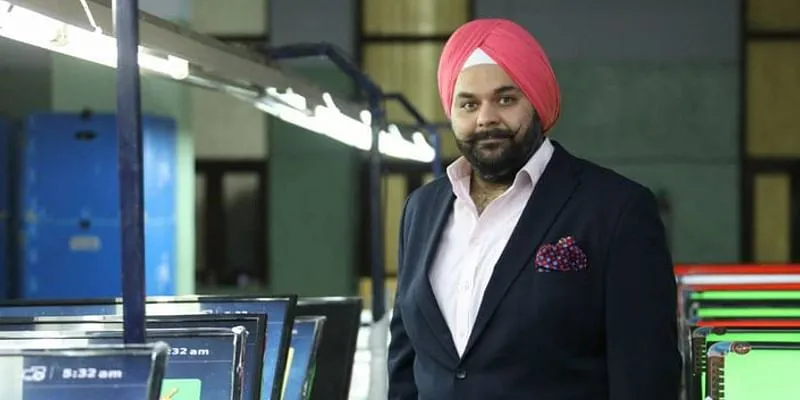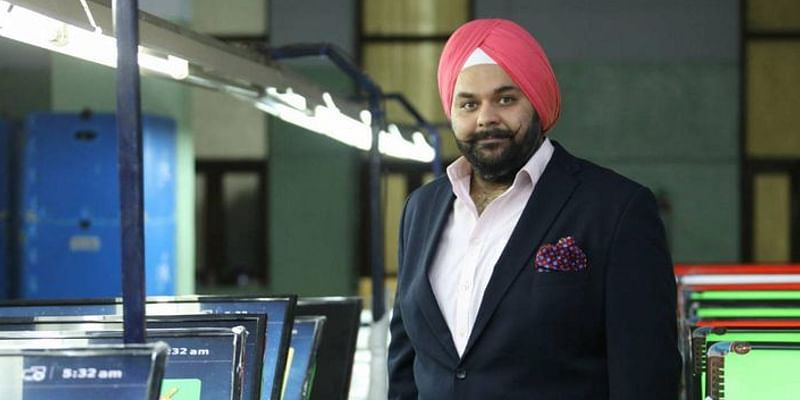Why COVID-19 presents the best opportunities for local manufacturers to win the market
Avneet Singh Marwah, CEO of SPPL, discusses the impact of COVID-19 on the television industry and why this is the time for local manufacturers to win the market.
It is the right time to be an Indian manufacturer with the increasing buzz around Make in India and Aatmanirbhar Bharat. Avneet Singh Marwah, CEO of Super Plastronics Pvt. Ltd. (SPPL), a Noida-based television production company, calls these “the best times”.

Avneet Singh Marwah, CEO of Super Plastronics Pvt. Ltd.
SPPL was started in 1991. It is a brand licensee for Thomson, which is a trademark of Technicolor S.A., a French business conglomerate that also manufactures digital set-top boxes for Europe and the Middle East.
SPPL claims to have five percent share in the Indian television market ever since its launch in the country in 2018. The business recently partnered with Google to make Android TVs which will be exported to places like Europe and South Africa.
Recently, SPPL or Thomson India announced that it will invest Rs 1,000 crore to boost its Make in India initiatives. Speaking to SMBStory, Sebastian Crombez, sales and marketing manager at Technicolor, said that some of the company’s Chinese suppliers and partners went bankrupt in the wake of COVID-19.
This forced it to look for alternatives. “We are looking for opportunities for India as COVID-19 has accelerated the need to shift to other alternatives,” he said, adding that the company is also working with partners in Vietnam and Thailand.
SMBStory spoke to Avneet and Sebastian on the impact of COVID-19 on the television sector, and the company’s plans to venture into the consumer appliances space.
Edited excerpts from the interview:
SMBStory [SMBS]: What has been the impact of the pandemic on the Indian television sector?
Avneet Singh Marwah [ASM]: Nobody was prepared for the lockdown. Zero sales of non-essential items deeply impacted the industry leading to a loss of Rs 10,000 crore in the consumer electronics space, leading to the waste of two million TV sets.
We looked forward to March, April, and May as these are the months after the festive season that always look promising, but this time, everything went down the drain because of the pandemic. Moreover, people have shifted towards OTT platforms, which has also impacted the demand for television.
Subsequently, as the economy started opening gradually, we saw a huge spike in online sales starting from Unlock 1. In our business, nothing has changed except everyone in the factory and elsewhere has to mandatorily wear masks and gloves and carry out the production. Operating with new norms is a big change.
SMBS: Televisions are heavyweight products that require a brick and mortar setup. This also gives consumers greater satisfaction. Will the online market be able to do justice?
ASM: This is the era of technology. From a manufacturing company, we are now focussed on becoming a technology company. In the coming months, we are also planning to introduce a fully automated and digitised testing system, which will pass a product if it is ready for sale.
It is by now clear that the demand in the coming months will largely be online, so we are putting our creativity into enhancing the online platform. We are also selling through our own website and ecommerce platforms like Amazon and .
Although the ease and comfort of the brick and mortar setup are incomparable, we post videos and pictures of our products that are closest to what they look like in reality.
We also have a free exchange offer that can be availed by customers within 10 days if they don’t like the product. The portals where we are listed also have strict parameters wherein it is imperative to post pictures that are closest to reality.
SMBS: How do you see competition in the domestic television market sketching out with more focus on Made in India products?
ASM: The coronavirus pandemic is, in a way, a blessing in disguise as initially, top brands- Samsung, LG and Sony- were ruling the market, but now smaller players will also get a chance. Competition is a good thing and it is going to be healthy.
However, Indian brands need huge investments for level-playing because the cost of setting up a plant in India is huge. I had been saying this initially and will reiterate that the Chinese have been pulling off our data and burn cash to occupy the market share.
India still has a long way to go. Only companies focusing on innovation and technology will survive. In the television sector, features matter the most. So, any brand in this domain needs to work according to Indian consumer needs and customise their products.
SMBS: You are entering into the consumer appliances space. What triggered this decision?
ASM: The penetration of consumer appliances is very low in India. Hence, there is a lot of growth potential. There are very few Made in India affordable brands doing justice to the consumer appliance market. Since work from home has now become the new norm, the demand for washing machines will now increase.
Hence, we decided to innovate and upgrade ourselves. As soon as the pandemic is over, we will start manufacturing in the plant in Greater Noida.
Thomson India will also be making an investment of Rs 1,000 crore in the coming five years, which will create 5,000 jobs in the next two-three years. A major chunk of this amount will go into marketing and R&D.
SC: Every crisis has a big impact on the economy but the plan to launch washing machines was set way before the crisis.
In France also, a lot of companies shut down because of the coronavirus pandemic. We didn't want to stop developing the product just because of the crisis. We have also partnered with Flipkart.
Edited by Saheli Sen Gupta











![[Weekly funding roundup] Investments into startups decline by 57 pc, closes at $107 million](https://images.yourstory.com/cs/2/f08163002d6c11e9aa979329348d4c3e/Weeklyimage-1577460362436.png)

